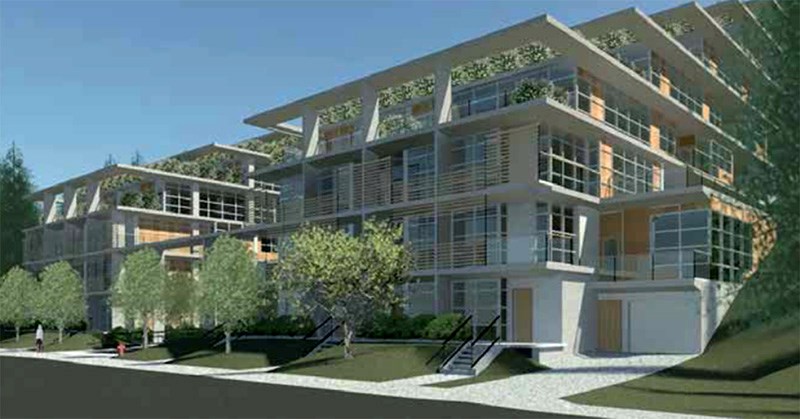The proponent of a 145-unit condo development planned for Port Moody's Chines hillside will have to do better than when the project first went before city council almost seven years ago.
At its meeting last week, council voted to rescind the first two readings of bylaw amendments that would have allowed the project, in the 3000-block of Henry Street, to proceed. Councillors cited several concerns about its accordance with current conditions and expectations.
The original proposal, which got to third reading in March 2012, will also be referred back to the city’s community planning advisory committee for further consideration.
The proposed U-shaped structure steps up to 11 storeys but a staff report presented to council said its unique position built into the Chines hillside — the north-facing slope that is south of St. Johns Street — means it would never appear higher than six storeys when viewed from the east or west elevation. A park of almost 5,000 square metres on the site’s south side would be dedicated to the city.
When the project was first brought to council, the developer was advised it needed to deal with some geotechnical, environment and stormwater management issues before it could proceed any further.Â
In March 2018, the property — comprised of four lots at the southwest corner of Buller and Henry streets — was sold to a new owner, the West Vancouver-based Atti Group. It had been listed on the website of realtor Colliers International for an asking price of $25 million since 2016.
Coun. Diana Dilworth, who was on council when the project was first considered in 2012, said back then, it was praised for its “state-of-the-day sustainability initiatives” as well as its terraced architecture. But times have changed, she said, and the project needs a new look from staff and council with “fresher, more relevant eyes.”
In his report, Port Moody’s senior planner, Kevin Jones, said one significant change to the city’s bylaws since 2012 has been an increase in required setbacks, especially from streams. Others include a provision for 70 adaptable units, an increase in required parking spaces for cars and bicycles, as well as the city’s latest requirement to have parking stalls equipped to accommodate electric vehicle charging stations.
Coun. Hunter Madsen said the development should also address contemporary concerns like providing a percentage of affordable rental units as well as assurances it can be built safely on a difficult, sloped site.
“Times are different and there are some things that are not strictly about bylaws,” Madsen said.
Jones told council staff is still looking at the extent of geotechnical work that has gone into the proposal in the past six years. He suggested those reports could even be subject to peer review.
Dilworth said there’s still much to like about the project.
“I think we need to look at those aspects we can sort of embrace and look at those we need to tweak,” she said.



